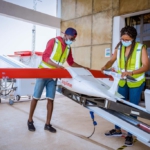
A critical segment of Ghana’s emergency medical supply chain has begun to collapse, threatening the lives of rural patients across the country.
Zipline, the global leader in instant logistics and medical drone delivery, has commenced the decommissioning of three of its operational centres, citing a crippling lack of funds from the central government.
The partial shutdown was brought to light during a heated debate on the 2026 Budget Statement in Parliament on Tuesday, November 25, exposing a severe fiscal gap in the health sector.
The Financials: A 89% Funding Gap
At the centre of the crisis is a staggering debt of GH¢175 million owed by the Government of Ghana to the service provider.
Despite this accumulation of arrears, the 2026 Budget has allocated a meagre GH¢20 million to the project.
This allocation represents just 11.4% of the outstanding debt, leaving a deficit of GH¢155 million and offering no pathway for the company to sustain its high-tech operations.
Dr. Ayew Afriye, the Ranking Member on the Parliamentary Select Committee on Health, broke the news to the House, accusing the Ministry of Finance and the Ministry of Health of negligence.
“The allocation for Zipline was only GH¢20 million, even though the government currently owes the company GH¢175 million,” Dr. Afriye revealed, brandishing the budget estimates.
Operational Impact: The “Golden Hour” at Risk
The shutdown of “Centres 4, 5, and 6” effectively severs the aerial lifeline for nearly half of the company’s coverage area.
While the Ranking Member referred to them by their operational numbers, these distribution hubs typically service a radius of 80 kilometres each. A single Zipline centre is designed to serve approximately 500 to 2,000 health facilities, delivering critical supplies within 30 to 45 minutes—often referred to in emergency medicine as the “Golden Hour”.
The decommissioning implies that hospitals and clinics in these catchment areas will no longer receive on-demand drops of:
- Life-saving Blood Products: Critical for haemorrhaging mothers during childbirth.
- Anti-Snake Venom: Vital for rural farming communities.
- Routine Vaccines: Essential for the Expanded Programme on Immunisation (EPI).
Dr. Afriye warned that the government’s silence has exacerbated the situation.
“Zipline is decommissioning three of its centres, Centres 4, 5 and 6. There has been no engagement and an inability on the part of the government to provide funds,” he stated.
A System in Retrograde?
The potential exit of Zipline from these regions marks a significant regression in Ghana’s healthcare infrastructure.
Since its inauguration in April 2019, the drone delivery service has been touted globally as a flagship partnership, successfully completing hundreds of thousands of commercial deliveries.
Critics argue that reverting to road transport for emergency supplies in these specific areas—often characterised by poor road networks and island communities—will inevitably lead to slower response times and increased preventable mortalities.
The Minority Caucus has demanded an immediate intervention from the Ministry of Finance to halt the decommissioning process, warning that the cost of inaction will be measured not just in cedis, but in human lives.

